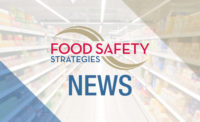The benefits of bundling sanitation labor and chemicals

Sanitation is not a one size fits all process. It’s a complex microbiological formula that requires close collaboration among both chemical providers and professional sanitors, including everything from the sanitation design plan to the training and daily execution.
When chemicals are ordered, often among disparate suppliers, without any interaction with the sanitization experts, it leaves many potentially costly gaps in the process that are extremely risky for the overall effectiveness of the sanitization program, as well as the safety of the employees.
Just one small gap or miscommunication can lead to major issues if not managed appropriately.
As these risks become greater and the rules and regulations become tighter, processors are digging deeper into their food safety plans and approach to sanitization. Companies want to do the right thing and make sure food is safe, but many are realizing its simply not enough just to have all the right pieces in place.
While usually done in an effort to save money and maintain greater control, disparate sanitization management ends up costing businesses significantly more. And, more importantly, it puts people’s safety at risk when they are not trained appropriately.
In order to manage food safety at the highest level, it is best that sanitation services and chemicals be bundled as part of one complete program. Here are just a few of the clear and proven advantages on why, and how this approach will benefit your business:
Employee Safety
Injuries are one of the leading disruptions to any sanitization program. It is critical that sanitation teams work with the exact same products and handling procedures, including color codes and chemical strengths, they are trained on to prevent injury. Sanitors frequently mobilize across multiple sites and when they are trained and familiar with a specific line of chemicals across all sites, it results in fewer accidents and disruption to production time.
Efficiency
When sanitors are trained and familiar with a specific line of chemicals it helps increase cleaning efficiency necessary to get quality plant sanitation completed on time. The ability to mobilize support wherever and whenever needed is also an important aspect to complete nightly plant sanitization. If the chemicals are consistent at each partner location, it significantly increases the training efficiencies needed to keep the sanitation program operating at full-speed.
Consistency
Consistency is key in controlling pathogens. It requires diligence and collaboration between sanitization and chemical experts but should be centered around a thorough and consistent approach. When sanitation crews are trained with specific chemicals and chemical handling procedures, they more likely to execute consistently on a nightly basis, and with more consistent sanitation and food safety outcomes.
Cost Savings
Inventory management of sanitization chemicals and products are significantly more difficult when there are numerous vendors, resulting in product waste when not centrally managed. When a provider can manage familiar inventory and handling procedures to ensure the products are being used effectively, the result is lower product costs.
Accountability
When you have one food safety partner managing all the products, chemical handling procedures and services as part of your sanitization program, there is clearer accountability for who is responsible in making sure the job gets done right. If a situation were to arise related to an injury, foodborne illness outbreak or product recall, actions can be taken more quickly to investigate or resolve the issue when resources and communications are more clearly defined.
Customized Support
Sometimes there are specific needs that arise for a sanitization program due to unique plant environmental or equipment changes that require custom adjustments to be made. When sanitors and chemical experts are part of the same team, there is streamlined communication and they can respond to the specific needs more quickly. Additionally, there may be other benefits to having direct access to a wider range of chemicals and chemical dispensing equipment beyond food safety and sanitation programs such as general plant cleaning or worker hygiene.
Overall, the brand and financial risks are simply too high in today’s food production industry that we’re seeing played out in the news on almost a daily basis. Sanitization has a higher purpose than simply cleaning the plant. It’s about streamlining and managing the sanitation process in a more effective way to advance food safety and sanitation methods, while hopefully saving some money in the process.
Looking for a reprint of this article?
From high-res PDFs to custom plaques, order your copy today!





